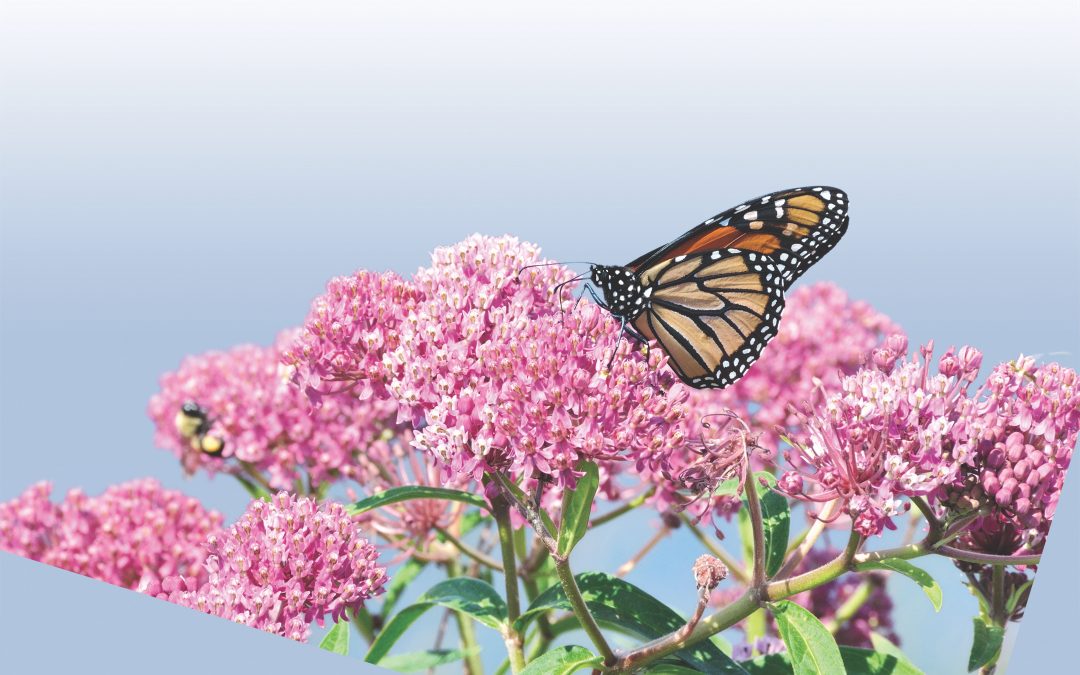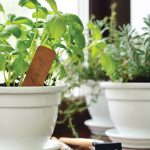One third of the food we eat comes from plants that are pollinated by bees. Without bees and butterflies to carry pollen from one blossom to another, flowering plants cannot make fruits, vegetables or seeds. But the populations of our native bees and butterflies are in serious decline due to loss of habitat and increased use of pesticides in agriculture and home lawns and gardens. The goals of the Pollinator Conservation Project at Sahli Nature Park are to provide habitat for pollinators and to provide education about pollinator conservation.
In our greenhouse, we grow many varieties of annual and perennial flowers for our pollinator gardens. These plants are rich in pollen and nectar – food for bees and butterflies. Some of the plants
we grow are host plants where butterflies will lay their eggs.
We also raise several types of milkweed to feed the Monarch caterpillars we raise. This year, we are expanding our gardens and including a variety of herbs. Many kinds of bees are attracted to the flowering herbs. When you come to the park this summer, be sure to visit our gardens around the greenhouse and the barn. How many different kinds of butterflies and bees will you see flying around the colorful flowers? You may even see a Hummingbird Moth!
Once again, beginning at the end of June, we will be raising Monarch butterflies in the greenhouse. The greenhouse will be open daily. Visitors can watch hungry black, white and yellow striped caterpillars munching on milkweed, observe the transformation of caterpillars into bright green chrysalises, and see the emergence of the orange and black adult butterflies. The butterflies are kept in a large net enclosure in the greenhouse where they will mate and lay eggs on milkweed. Several times during the summer, we release the butterflies. The dates of the releases will be posted in the park and on our Sahli Nature
Park Facebook page. We invite everyone to come and help us set the butterflies free. Come to the Monarch butterfly nursery in the greenhouse and let a butterfly dance on your finger! It tickles!
Another part of our Pollinator Conservation Project is to provide nesting boxes for bees. Not
all bees live together in large colonies like honeybees do. Many of our native bees are solitary
and make their nests in holes in trees or in the ground. Around our pollinator gardens you may see bee nesting boxes, blocks of wood drilled with small holes or flower pots filled with paper straws. A female bee enters the straw or hole and lays a single egg. To feed the larva that will hatch, the bee leaves a bit of “bee bread”, a mixture of pollen and bee saliva. To protect her egg, she seals the end of the hole with a bit of leaf or a dab of mud. The larva eats the bee bread, grows and forms a pupa (something like a chrysalis), then emerges as an adult bee and leaves the hole.
When you visit our greenhouse and gardens, we will be glad to tell you all about the bees and the butterflies and how you can help them in your own home gardens and landscapes.
Kids Camp Extreme
Sahli Nature Park and Stray Cat Art Studio in Beaver Falls are joining together to offer a nature and art camp for kids. Each two-day session will be filled with nature activities, games and nature walks with our park naturalist and special clay art projects with the artists from Stray Cat Studio. In the first session, July 5 & 6, kids will explore animals that live in the pond – fish turtles, dragonflies, frogs and tadpoles – and make fish prints on special paper with metallic inks. Kids will also create a unique fish clay project. In the second session, August 2 & 3, kids will learn about food chains with a special project about owls and what they eat. With guidance from the Stray Cat artists, kids will make a ceramic owl planter and fill it with colorful flowers. Kids’ Camp sessions are at Sahli Nature Park located at 194 McKinley Road, Chippewa on Friday and Saturday from 10:00 – 1:00 each day, for ages 6 and up. Please call Stray Cat Studio for fees and registration (724) 494- 9347.







